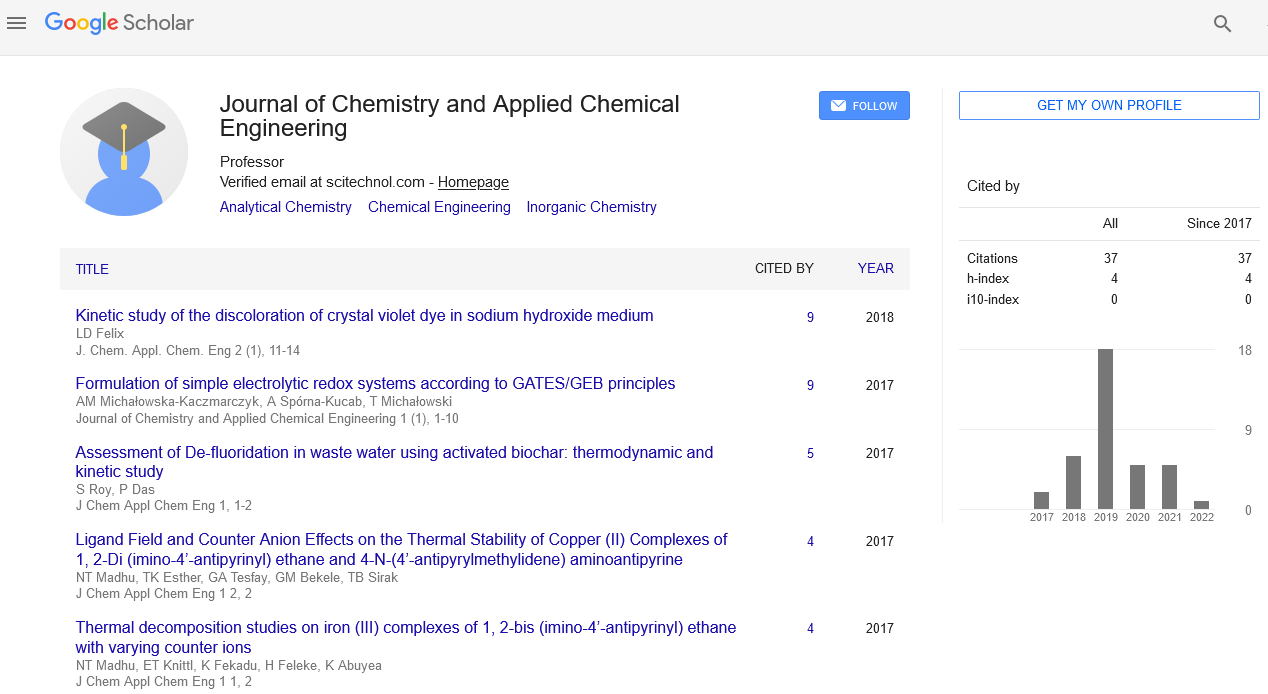Physical and Mechanical Properties of Fibre Reinforced Concrete
Nnam, Raphael Eze and Ejeke, Victor Chinecherem
University of Benin, Nigeria
Akanu Ibiam Federal Polytechnic, Unwana Ebonyi State Nigeria
: J Chem Appl Chem Eng
Abstract
The increase in price of petroleum and environmental concerns has made the search for alternative fuels to gain importance. Biodiesel is one of several alternative fuels that is renewable and can be manufactured from vegetable oils. The main objective of the research is to produce biodiesel from waste vegetable oil using activated egg shell waste as solid catalysts. Transesterification reaction was performed for the conversion to biodiesel. Waste eggshells were calcined at 700°C, 800°C and 900°C for a time period of 3hrs for the preparation of renewable catalyst. The calcined waste eggshell catalyst was characterized using X-Ray Florescence (XRF) Spectroscopy which revealed CaO as the major constituent (90.86%), this was further confirmed by X-Ray Diffraction (XRD) and Fourier Transform Infrared (FTIR) analyses. The prepared catalyst was used for transesterification reaction and the effects of calcination temperature (700 to 900°C), DES loading (3 to 18 wt. %), WES catalyst loading (6 to 14 wt. %) on the conversion to biodiesel were studied. The yield of biodiesel using waste eggshell catalyst (91%) is comparable to conventional catalyst like sodium hydroxide with a yield of 80-90%. The maximum biodiesel production yield was obtained at a specific oil-to methanol molar ratio of 1:10, a temperature of 65°C and a catalyst loading of 14g-wt%. The biodiesel produced was characterized as being composed of methyl Tetradecanoate (C14H28O2) 30.92% using the Gas Chromatographic (GC-MS) analysis. The fuel properties of the biodiesel (Flash point 138oC) were comparable to commercial diesel and hence it can be used in compression-ignition engines. The results indicated that the catalysts derived from waste egg shell had high potential to be used as biodiesel production catalysts in transesterification of waste vegetable oil with the advantage of reusability and also not requiring water washing steps.
Biography
Nnam, Raphael Eze is a graduate of Chemical Engineering from the Federal University of Technology, Owerri, Imo State Nigeria. He is at present, a faculty member of the Department of Food Technology, Akanu Ibiam Federal Polytechnic, Unwana Ebonyi State Nigeria. He is a passionate researcher and has devoted his time into researching on various aspects of Food Engineering. He has several academic publications in reputable peer-reviewed journals and a sought after in conferences. He is happily married with his heartthrob – Sweet.
 Spanish
Spanish  Chinese
Chinese  Russian
Russian  German
German  French
French  Japanese
Japanese  Portuguese
Portuguese  Hindi
Hindi 